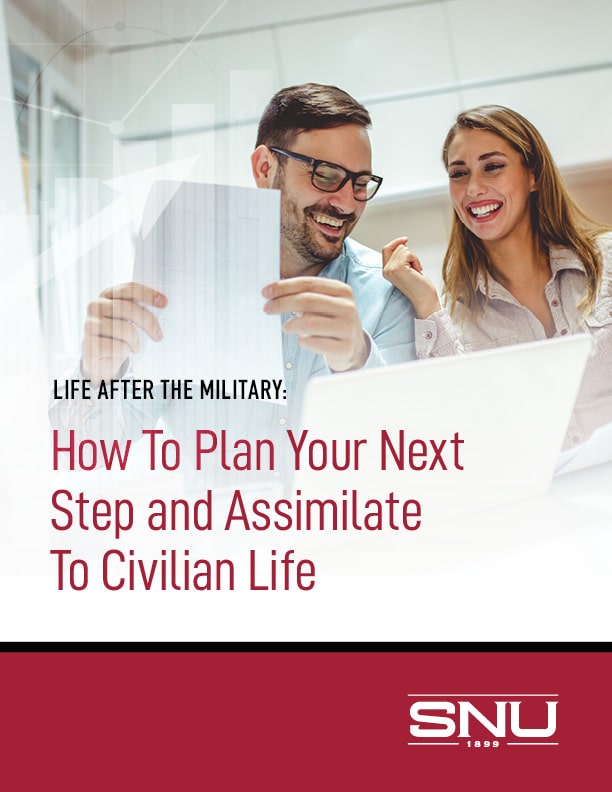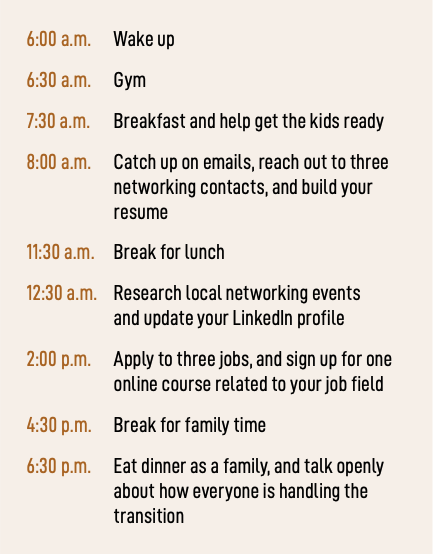-
Programs
Not Sure Where to Start?
- Associate Programs & Certificates
- General Studies
- Associate of Arts in Business
- Physical Therapist Assistant
- Professional Services & Certificates
- Special Education Bootcamp
- View All
- Undergraduate Programs
- Business Administration
- Criminal Justice
- Cybersecurity
- Education
- Family Studies and Gerontology
- Healthcare Administration
- Organizational Leadership
- Accelerated General Education
- View All
- Graduate & Doctorate Programs
- Doctorate of Education in Administration & Leadership
- M.A. Administration of Special Ed.
- M.A. Applied Psychology
- M.A. Educational Leadership
- M.A. Sports Management & Administration
- M.A. Teaching
- MBA, 12- 18 months
- MBA - Healthcare Administration
- Master of Organizational Leadership
- M.S. Counseling Psychology
- M.S. Exercise Science - Health & Human Performance
- M.S. Exercise Science - Wellness
- M.S. Instructional Design Technology
- M.S. Management
- M.S. Physician Assistant
- Alternative Certification (Teaching or Special Ed.)
- View All
- Resources
- Tuition & Aid
- Military
.jpeg?width=2121&height=1414&name=GettyImages-1267303976%20(2).jpeg)
Introduction
The transition from military to civilian life leads veterans down a path of many twists and turns. A Pew Research Center survey found that about a quarter of veterans struggled to adjust to life after their days in the service were behind them.
But transitioning out of the military can be a positive and rewarding experience as well. For veterans who have built careers on adaptability and quick thinking, life after the military is just another pivot. With some careful planning and a positive outlook, you can set yourself up for a lifetime of success long after you hang up your uniform.
If you’re thinking about retiring from the military, this guide will provide a comprehensive breakdown of the entire process to ensure your success at each step along your journey: from early-stage preparation, to leaving the military, to landing your first post-military job.
Download a PDF version of this guide by filling out this form, or keep scrolling to read.

Chapters
Why Is Preparing for Retirement Important?
What Is the Best Way To Prepare for Retirement?
How to Be Successful Once You Enter Retirement
Real-Life Assimilation Story: Mark Nadig
Assimilation Checklist

Why Is Preparing for Retirement Important?
Many military members underestimate the importance of preparation in anticipation of retirement. It’s easy to get caught up with a projected retirement date without committing to the careful preparation years in advance.
After all, retiring from the military comes with many benefits. Retirees can look forward to military retirement pay or pension, social security benefits, VA disability benefits and Aid and Attendance and Housebound benefits for veterans and survivors.
Although retiring can sometimes lead to the following struggles in the short-term, allowing ample time for preparation can help mitigate these challenges.
Struggling To Identify Purpose
A sense of identity and purpose are so deeply ingrained in those who serve our country. However, that purpose-driven mentality can get turned upside down when retired military veterans are left to navigate uncharted territories in the civilian world. Luckily, the right preparation can help you identify your strengths, develop competitive skills, and strategize career goals after retirement.
Struggling To Find Work
Landing a job after retirement may seem simple. Fill out a dozen or so resumes, then sit back while the requests to interview roll in. Easy enough, right?
While this certainly can happen, it often takes recently retired veterans much longer than anticipated to land their first job outside of the military. To be successful, your new career path will require ample preparation to update your resume, get a feel for the current job market, and build a realistic timeline. Set deadlines for yourself at least 8-12 months ahead of your anticipated retirement date to begin the search and get your resume up to date.

Building a Sense of Community
Research shows that 70% of jobs are never posted online. Of the job openings with online listings, an estimated 50% of vacant positions are filled internally. Word-of-mouth job recommendations account for as many as 80% of filled positions, according to the same study. So if it feels like you’re sending hundreds of resumes out into the ether without receiving any feedback, it’s not all in your head.
Veterans may struggle post-retirement to recreate the close bonds they shared with other service members while on duty. Networking with other professionals who share backgrounds, interests and career goals offers a sense of community and eases the transition from military to civilian life. Veterans not only learn about new industries and foster relationships with potential employers, but also engage with peers who can provide encouragement, mentoring, or insight about the job market.
But building your network can mean more than expanding your job prospects. Getting tuned into school, church, volunteer, or veterans organizations at the local level is vital. These connections provide a sense of belonging for the whole family and combat feelings of isolation during this period of great transition.

What Is the Best Way To Prepare for Retirement?
Don’t wait until the last minute. Preparations should begin about three years before you officially want to retire. Set up retroactive milestones one, two, and three years out from your retirement date, so you have plenty of time to plan.
Three Years Prior To Retirement
Begin by considering your long-term goals. First, ask yourself, Have I served long enough to qualify for a pension? Typically, a veteran receives a pension only after 20 years of service.
Then consider, What’s right for me and my family at this stage of life? You may be inclined to make the military a long-term career, but conclude that it’s not the right decision for your family. Consider the effect that your career choice will have on your spouse and children during this planning phase.
If a long-term military career is on your horizon, determine a tentative retirement date. At the 20-year mark, after you are eligible for a pension, will you retire or will you continue to serve?
On the other hand, if you’ve concluded that you want to pursue a long-term career outside of the military, figure out what interests you and determine whether location or career is more important to you. Then start to get the ball moving as you work toward next steps.
Other questions you should ask yourself early on, so you have ample time to set and achieve your goals, include the following:
- Are there skills you need to refine to accomplish your career goals?
- Do you know someone who has gone through this process and could serve as a peer mentor?
Two Years Prior To Retirement
Treat this year as if you are conducting a mission analysis. Conduct more extensive research about the paths you can take post-military, and compare the benefits and setbacks of each.
Throughout this year, there are six main things you’ll want to focus on:
1. Make an emotional break from the military.
For many long-serving military, one of the most profound steps along your career path, should you choose to retire, is making an emotional break from the military. You begin to realize that you’re not letting down the army or your fellow soldiers if you choose to retire; you’re simply choosing to pursue a new path. Once you’ve wrapped your mind around the military as a short-term career, you can begin to consider other professional prospects more seriously.
2. Update your resume.
Now is a good time to update your resume and seek support if resume writing is new to you. You’ll also want to solidify how you will use your VA education benefits, including the following factors:
- Will you make the decision to go back to school?
- Will you pass your benefits to a spouse or child?
3. Find a peer mentor that you can trust and lean on.
It’s important to remember there are ways to mitigate the initial feelings of isolation that may creep in, especially during the early stages of your job search process. Lean on a peer mentor who has gone through something similar for support. Learning from their real-life experiences can provide both inspiration and practical advice about what it takes to be successful post-retirement.
4. Begin to network with people outside of the military.
Career fairs may provide some general information about job qualifications, but they often aren’t geared toward military members who are seeking positions beyond entry-level work. Network with as many people as possible. Getting yourself out there broadens your career prospects and may encourage you to explore career opportunities you hadn’t yet considered. Over time, you can build confidence that will prepare you to meet these new challenges.
5. Think strategically about how to use your last leave days.
Rather than saving your accrued time to indulge in a few weeks of paid leave, consider spacing out your days off to prepare job interviews, attend a career fair, visit colleges or ease the process of acclimatizing to civilian life.
6. Create a savings plan.
There are going to be hidden costs as you make the transition to retirement. What will your financial strategy look like so that you don’t cut into long-term savings? You’ll want to consider things like traveling to interviews, fees associated with networking events, housing expenses and so forth.

One Year Prior To Retirement
At the one year mark, it’s time to get strategic about how to achieve your goals and set up a support system for life after the military with the following four steps.
1. Take advantage of TAP opportunities.
At this time, you’ll participate in the Transition Assistance Program (TAP). This is a requirement, but it’s important to approach the program proactively: You’ll only get out of it as much as you put in. As part of the program, you can sign up for workshops based on your personal and professional interests. Each service member can select one or multiple tracks, including education, professional employment, vocational training or entrepreneurship.
Your TAP counselor will be a huge support during this time. They will outline the steps you must take from the day you first meet until retirement and set up a timeline to help you achieve your goals in a reasonable amount of time.
2. Set up a meeting with the VA.
Months before your retirement, you’ll want to set up an appointment with the Veterans Administration (VA) to determine your eligibility for disability benefits. Appointments can be hard to come by, but the benefits are substantial, so get this done as soon as possible.
3. Polish your resume.
Take your resume building and networking one step further during your final year. Polish your resume and begin to tailor each resume you send out based on the job description. Follow up with networking contacts and schedule a time to meet up or chat over the phone.
4. Embrace other resources to ease your transition.
You’ll also want to make sure to take advantage of military-sponsored benefits. Keep an eye out for workshops intended to support spouses and family members. You may also find sessions related to self-development to help ease your transition.
Your final year may seem overwhelming from a distance, but it doesn't have to be. Diligent preparation and careful time management will yield a fruitful conclusion to your military career. Take the time you need to emotionally accept the life transitions you are about to embark on. In doing so, you’ll be able to reap the full benefits of support and resources given to all service members.

How to Be Successful Once You Enter Retirement
Although preparation is a critical step in successfully assimilating into civilian life, many new veterans still struggle to adjust to their new lifestyle, post-retirement. Employ the following strategies to help you remain productive and optimistic.
Allow Yourself Time To Decompress
Leaving any career behind can feel like a major life change. Leaving the military is not only a career shift but a lifestyle transition as well. Give yourself time to reflect, regroup and reprioritize.
While in the military, you may have spent a significant amount of time away from family. Use this time to reconnect. Plan family activities and short weekend getaways. Discuss any plans to relocate. Most importantly, keep the lines of communication open. This is a big transition for all family members. The more openly you can speak about what you’re experiencing, the smoother the transition will be.
Maintain a Schedule
Post-retirement, your time is your own. It may be tempting to forgo any formalized schedule now that no one is giving you daily orders about where you need to be and when. Resist the urge to sleep in most mornings or spend the day in pajamas. Instead, create a regimented schedule that you can follow daily.
For example, a daily schedule structure may follow this pattern:

Creating a daily schedule will prove rewarding for both you and your family. You’ll spend equal parts of your day fulfilling personal productivity goals and bonding as a family unit.
Continue Networking and Sending Out Resumes
Your job search should be a combination of both sending out resumes and connecting with others via professional networking. Sending out 10 or more resumes per day can feel like quite the feat, and it’s easily quantifiable, but making real-life connections with those in your field is equally if not more important. You never know when a conversation over a cup of coffee with a friend will lead to information about job openings or other professional contacts.
Embrace the Job Hunt
The job hunt process is a marathon, not a sprint. It’s ok to feel anxious, frustrated or discouraged, but don’t let it get the best of you. Stick to your regular routine and continue to lean on your mentor for support. Remember that you are not alone, and resources are available to help guide you through your search.
Consider Leveraging VA Benefits
Before you make definitive decisions about your next career move, consider how you may be able to take advantage of your VA benefits. For example, going back to school can open the door to many career paths that may not be available to you otherwise.
Take Advantage of Local Veterans Resources
Pursue local resources that are aimed at helping veterans succeed. American Corporate Partners (ACP) is just one of many resources for you to consider. ACP eases the transition from military to civilian life through its mentorship program, including workshops tailored to the needs of spouses.
Each state also has its own State Department of Veteran Affairs that sponsors local job fairs, workshops and other networking events. Check out your local chamber of commerce to connect with veterans programs that may be unique to your area.
Although Military OneSource primarily benefits active duty military members, it also lends valuable insight to recently retired veterans regarding education, childcare, health and wellness, spouse education, finances and taxes.

Real-Life Assimilation Story: Mark Nadig
Mark Nadig knows firsthand just how taxing the transition from military life to civilian life can be after 24 years of military service — but he’s also learned many lessons along the way. Four years out from retirement, Nadig says he’s proud of the life he and his wife have created for their family.
Looking back, Nadig says he wishes he would have started retirement preparations earlier, and he recommends you do too. It’s important to invest time into resume building and networking during your final year, but don’t take on such a myopic view that you lose sight of valuable time as a family. Take this time to communicate with your children about the transition, and make a point to attend more family events.
In the military, as you rise in rank, you develop skills as a leader and communicator. Nadig remembered supervisors assuring him that his skills would transfer well to professional life after military service. However, this initial praise only muddied the waters as Nadig began his job search. He said he had false expectations about the ease with which he would land his next job. In retrospect, he wished he had taken advantage of his Veteran Administration evaluation and that he started networking and applying to jobs sooner.
As the months flew by, feelings of anxiety, frustration and rejection started to creep in after getting rejected from multiple job opportunities. To add to the stress, Nadig and his family were set to relocate to Oklahoma by late summer, but without a definitive job offer and a clear path forward.
Seven months later, Nadig’s diligent networking paid off. After speaking with a friend, Nadig learned more about a contractor position supporting the Army ROTC program out of University of Central Oklahoma. From there, he was introduced to SNU.
Today, Nadig works as the Director at SNU’s Veterans Educational Transitions Success (VETS) Center. The VETS Center strives to help veterans transition to life on campus with community support. Nadig says he finds it rewarding to mentor the next generation of officers and to continue the legacy of serving his country, in a renewed sense.
Upon reflection, Nadig highlights the sacrifices that all family members make to support and uproot, when necessary. Spouses in particular give up a lot, but the mentality of working through things as a team makes all the difference. “I feel fortunate and blessed that we're still learning and growing as a couple, as a family and as individuals.”
Above all, Nadig says he’s proud of his family and excited for their future together. “As a family, we learned that we’re not always going to get a good break, but we’re prepared to deal with it. We're flexible and agile as a family, and we will always adjust to keep moving forward.”

Assimilation Checklist
If military retirement may be in your near future, make sure that you start taking the steps today to be prepared. Here’s a checklist to help you get started.
Preparation: 3 Years Before Retirement
- Ask: Have I served long enough to qualify for a pension?
- Ask: What’s right for me and my family at this stage of life?
- Brush up on marketable skills.
- Consider who would make a good mentor.
Preparation: 2 Years Before Retirement
- Execute a mission analysis: Weigh the pros and cons of several career paths.
- Make an emotional break from the military.
- Update your resume.
- Lean on a mentor.
- Solidify your VA benefits.
- Plan out your leave days.
- Begin to network.
- Create a savings plan: to help with any unforeseen costs or financial emergencies
Preparation: 1 Year Before Retirement
- Participate in the Transition Assistance Program (TAP).
- Schedule appointments with the Veterans Administration to assess your benefits.
- Start sending out resumes and networking.
- Sign up for workshops related to your career pursuits.
- Take advantage of military-sponsored events.

Tips To Succeed During Retirement
- Allow yourself time to decompress.
- Maintain a schedule.
- Continue to network and send out resumes.
- Embrace the job hunt process.
- Leverage your benefits.
Resources To Keep in Mind
Take advantage of the following resources as you navigate the next step in your life:
- State Department of Veterans Affairs
- Local Chamber of Commerce
- American Corporate Partners (ACP)
- Military OneSource
SNU’s VETS Center works with you, whether you’re hoping to rise in the ranks or set out on a fresh career path. Our full-time VETS staff are here to support you at every turn and direct you to the resources you need most.
To learn how to get started, visit the VETS Center online today.
Download a PDF version of this guide by filling out the form









%20(1)-1.jpg?width=920&height=480&name=GettyImages-659789466%20(1)%20(1)-1.jpg)

%20(1).jpg?width=920&height=480&name=GettyImages-1135697741%20(1)%20(1).jpg)



